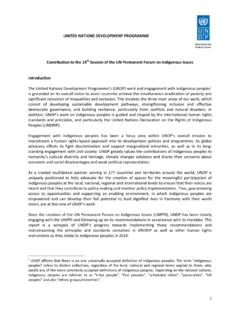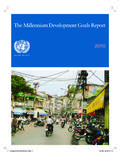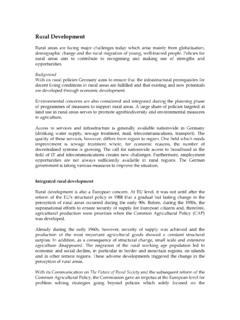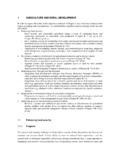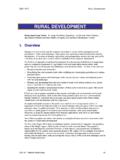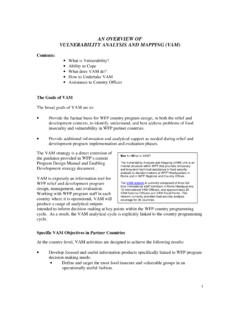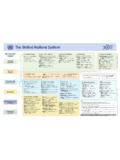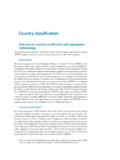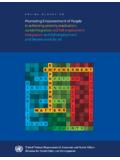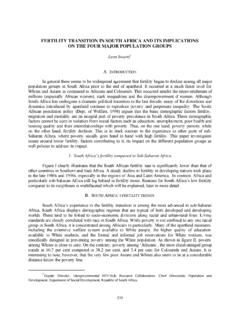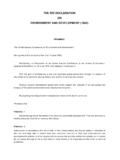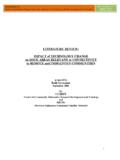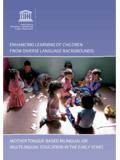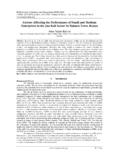Transcription of Plan of Implementation of the World Summit on …
1 Page 1 Plan of Implementation of the World Summit on Sustainable Development Contents Chapter ParagraphsPageI. 68II. Poverty 139 III. Changing unsustainable patterns of consumption and 2313IV. Protecting and managing the natural resource base of economic and social development ..24 4620V. Sustainable development in a globalizing 5237VI. Health and sustainable development ..53 5739 VII. Sustainable development of small island developing 6141 VIII. Sustainable development for 7143IX. Other regional 8048A. Sustainable development in Latin America and the 7449B. Sustainable development in Asia and the 7649C. Sustainable development in the West Asia 7850D.
2 Sustainable development in the economic Commission for Europe 8050X. Means of 13650XI. Institutional framework for sustainable development ..137 17064A. Strengthening the institutional framework for sustainable development at the international level 140 14265C. Role of the General Role of the economic and Social Role and function of the Commission on Sustainable 15067F. Role of international 15769G. Strengthening institutional arrangements for sustainable development at the regional 16170H. Strengthening institutional frameworks for sustainable development at the national 16771I. Participation of major 17072 Page 2 I. Introduction 1. The United Nations Conference on Environment and Development, held in Rio de Janeiro in 1992,1 provided the fundamental principles and the programme of action for achieving sustainable development.
3 We strongly reaffirm our commitment to the Rio principles,2 the full Implementation of Agenda 212 and the Programme for the Further Implementation of Agenda 213. We also commit ourselves to achieving the internationally agreed development goals, including those contained in the United Nations Millennium Declaration4 and in the outcomes of the major United Nations conferences and international agreements since 1992. 2. The present plan of Implementation will further build on the achievements made since the United Nations Conference on Environment and Development and expedite the realization of the remaining goals. To this end, we commit ourselves to undertaking concrete actions and measures at all levels and to enhancing international cooperation, taking into account the Rio principles, including, inter alia, the principle of common but differentiated responsibilities as set out in principle 7 of the Rio Declaration on Environment and These efforts will also promote the integration of the three components of sustainable development economic development, social development and environmental protection as interdependent and mutually reinforcing pillars.
4 Poverty eradication, changing unsustainable patterns of production and consumption and protecting and managing the natural resource base of economic and social development are overarching objectives of, and essential requirements for, sustainable development. 3. We recognize that the Implementation of the outcomes of the Summit should benefit all, particularly women, youth, children and vulnerable groups. Furthermore, the Implementation should involve all relevant actors through partnerships, especially between Governments of the North and South, on the one hand, and between Governments and major groups, on the other, to achieve the widely shared goals of sustainable development.
5 As reflected in the Monterrey Consensus,6 such partnerships are key to pursuing sustainable development in a globalizing World . 4. Good governance within each country and at the international level is essential for sustainable development. At the domestic level, sound environmental, social and economic policies, democratic institutions responsive to the needs of the people, the rule of law, anti-corruption measures, gender equality and an enabling environment for investment are the basis for sustainable development. As a result of globalization, external factors have become critical in determining the success or failure of developing countries in their national efforts.
6 The gap between developed and developing countries points to the continued need for a dynamic and enabling international economic environment supportive of international cooperation, particularly in the areas of finance, technology transfer, debt and trade and full and effective participation of developing countries in global decision-making, if the _____ 1 Report of the United Nations Conference on Environment and Development, Rio de Janeiro, 3-14 June 1992 (United Nations publication, Sales No. and corrigenda). 2 Ibid., vol. I: Resolutions Adopted by the Conference, resolution 1, annexes I and II. 3 General Assembly resolution S-19/2, annex.
7 4 General Assembly resolution 55/2. 5 Report of the United Nations Conference on Environment and Development, Rio de Janeiro, 3-14 June 1992 (United Nations publication, Sales No. and corrigenda), vol. I: Resolutions Adopted by the Conference, resolution 1, annex I. 6 Report of the International Conference on Financing for Development , Monterrey, Mexico, 18-22 March 2002 (United Nations publication, Sales No. ), chap. I, resolution 1, annex. Page 3 momentum for global progress towards sustainable development is to be maintained and increased. 5. Peace, security, stability and respect for human rights and fundamental freedoms, including the right to development, as well as respect for cultural diversity, are essential for achieving sustainable development and ensuring that sustainable development benefits all.
8 6. We acknowledge the importance of ethics for sustainable development and, therefore, emphasize the need to consider ethics in the Implementation of Agenda 21. II. Poverty eradication 7. Eradicating poverty is the greatest global challenge facing the World today and an indispensable requirement for sustainable development, particularly for developing countries. Although each country has the primary responsibility for its own sustainable development and poverty eradication and the role of national policies and development strategies cannot be overemphasized, concerted and concrete measures are required at all levels to enable developing countries to achieve their sustainable development goals as related to the internationally agreed poverty-related targets and goals, including those contained in Agenda 21, the relevant outcomes of other United Nations conferences and the United Nations Millennium Declaration.
9 This would include actions at all levels to: (a) Halve, by the year 2015, the proportion of the World s people whose income is less than 1 dollar a day and the proportion of people who suffer from hunger and, by the same date, to halve the proportion of people without access to safe drinking water; (b) Establish a World solidarity fund to eradicate poverty and to promote social and human development in the developing countries pursuant to modalities to be determined by the General Assembly, while stressing the voluntary nature of the contributions and the need to avoid duplication of existing United Nations funds, and encouraging the role of the private sector and individual citizens relative to Governments in funding the endeavours.
10 (c) Develop national programmes for sustainable development and local and community development, where appropriate within country-owned poverty reduction strategies, to promote the empowerment of people living in poverty and their organizations. These programmes should reflect their priorities and enable them to increase access to productive resources, public services and institutions, in particular land, water, employment opportunities, credit, education and health; (d) Promote women s equal access to and full participation in, on the basis of equality with men, decision-making at all levels, mainstreaming gender perspectives in all policies and strategies, eliminating all forms of violence and discrimination against women and improving the status, health and economic welfare of women and girls through full and equal access to economic opportunity, land, credit, education and health-care services.
